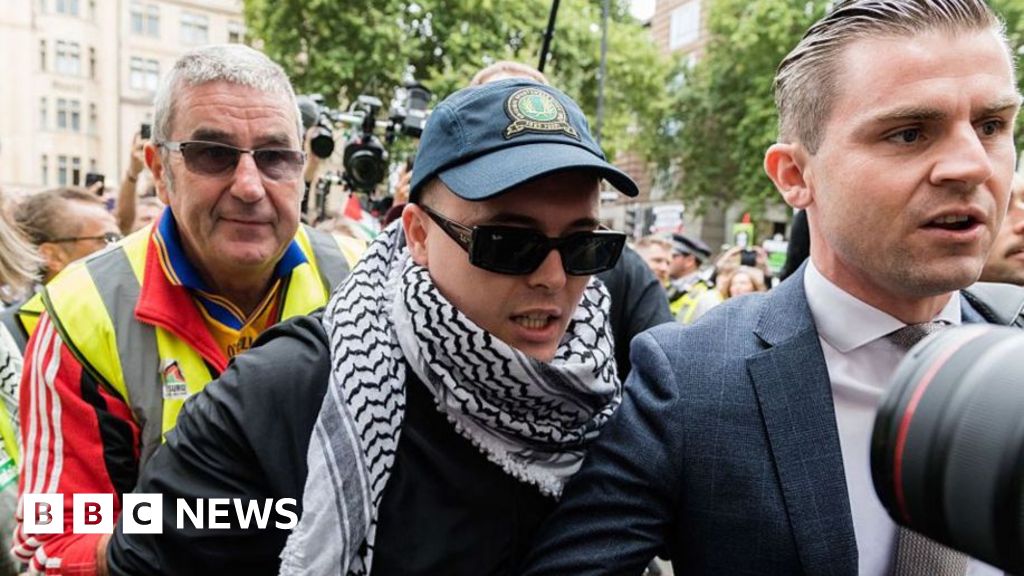Decision over Kneecrper terror charge delayed

Kneecap Rapper's Hezbollah Flag Case Faces Delay
A decision on whether Liam Óg Ó hAnnaidh, a member of the Irish-speaking rap group Kneecap, will face trial for allegedly displaying a flag in support of Hezbollah at a London gig last year has been postponed. The case raises complex questions about freedom of expression, the interpretation of terror-related offences, and the intersection of music, politics, and cultural identity.
Court Hears Arguments, Decision Pending
Ó hAnnaidh, who performs under the stage name Mo Chara, appeared at Westminster Magistrates' Court on Wednesday, met by a large crowd of supporters waving Palestinian flags. The 27-year-old denies the charge, calling the case "political" and an attempt to silence Kneecap. After the hearing, he addressed the crowd, stating the case was a "distraction" from the events in Gaza. Chief Magistrate Paul Goldspring announced that a decision on whether Ó hAnnaidh will stand trial will be made on September 26th.
During the hearing, Ó hAnnaidh confirmed his identity and address, with an Irish language interpreter present. The court heard three hours of legal arguments focusing on whether the charge was brought within the statutory six-month time limit. The defence team is seeking to have the case dismissed, citing a technical error in the charging process.
Brenda Campbell KC, representing Ó hAnnaidh, argued that the Attorney General had not granted permission for the terror charge when police initially informed the defendant of the impending charge on May 21st. Prosecutor Michael Bisgrove countered that such permission was not required until the defendant's first court appearance. The Chief Magistrate adjourned the case, releasing Ó hAnnaidh on continuing unconditional bail.
Supporters Rally, Police Impose Restrictions
A significant crowd gathered to support Ó hAnnaidh, holding signs reading "Free Mo Chara" and "Seaseann Muid Le Liam Óg" (We stand with Liam Óg). Band members Móglaí Bap (Naoise Ó Cairealláin) and DJ Próvaí (JJ Ó Dochartaigh), along with the band's manager, accompanied him.
The Metropolitan Police imposed Public Order Act conditions to manage the protest outside the court, designating specific areas for demonstrations and restricting the placement of stages. Kneecap responded on social media, claiming the police action aimed to portray support for the band as "troublesome" and urging supporters to comply with instructions.
Who are Kneecap?
Kneecap, formed in 2017, is a rap trio known for their Irish-language lyrics and often provocative themes. Their music blends hip-hop with traditional Irish elements, addressing social and political issues. Their rise to prominence inspired a semi-fictionalized film starring Michael Fassbender, which won a BAFTA in February 2025.
The group has faced previous controversy, including criticism for displaying messages about the war in Gaza during their performance at the Coachella music festival in April 2025. In November 2024, Kneecap successfully challenged the UK government's decision to withdraw an arts grant.
Context and Analysis
This case highlights the ongoing tension between artistic expression and legal restrictions, particularly in the context of terrorism legislation. Dr. Marie Cassidy, a lecturer in media law at Queen's University Belfast, notes, "The prosecution's reliance on terror-related charges raises serious questions about the scope of such laws and their potential chilling effect on artistic freedom. The courts must carefully balance national security concerns with the fundamental right to express political views, even if those views are controversial."
The case also underscores the complexities of cultural identity and political activism within the arts. Professor John O'Connell, an expert in Irish music and culture at Trinity College Dublin, adds, "Kneecap's use of the Irish language and their engagement with contentious political issues positions them within a long tradition of Irish artists using their work to challenge the status quo. This case could have significant implications for how such artistic expression is perceived and regulated in the future."
The outcome of this case will be closely watched by artists, legal scholars, and civil liberties advocates, as it could set a precedent for how similar expressions of political opinion through art are treated under the law.
Originally sourced from: BBC Entertainment
